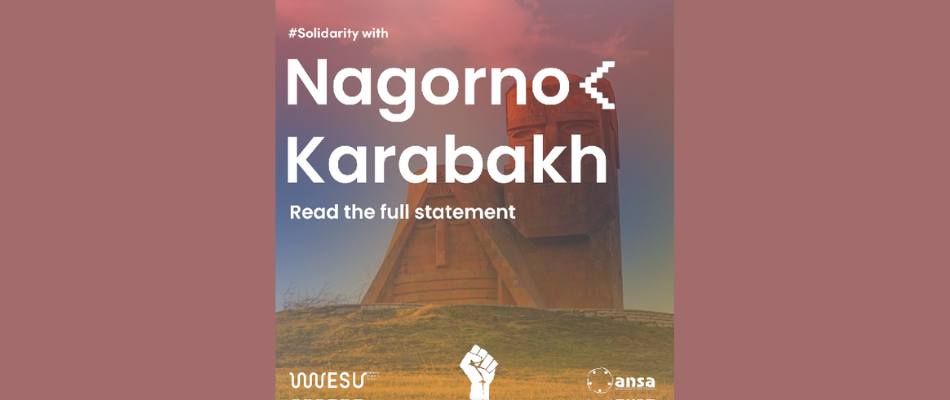
Solidarity with the people in Nagorno-Karabakh
On September 19, 2023, Azerbaijan launched a large-scale artillery assault against Nagorno-Karabakh, also known as Republic of Artsakh, deliberately targeting cities and civilians. This attack encompassed the entire territory of Nagorno-Karabakh․ This offensive represents the culmination of a ten-month-long blockade of the Lachin corridor and the imposition of a coercive strategy aimed at starving the Armenian population of Nagorno-Karabakh. The severe shortage of essential supplies such as food, medicine, fuel, natural gas, electricity, and other necessities had already pushed the vulnerable population of Nagorno-Karabakh to the brink of a humanitarian catastrophe.
This unfortunate situation left a distressing impact on the region’s young population, affecting the human right to education. Approximately 21000 children and students are left without access to daycare and education, highlighting a grave concern regarding the safeguarding of basic human rights, particularly the human right to education for individuals in conflict-affected areas. Moreover, this goes against the fundamental values and principles of the European Higher Education Area (EHEA).
Nagorno-Karabakh had established a broad higher education system with nine universities. Among them, Artsakh State University (ArSU) stood as the republic’s primary state-funded institution, nurturing a proud legacy of 50 years. ArSU had a current enrollment of approximately 3,000 students. Unfortunately, due to the challenges posed by geopolitical conflicts and their impact on the region, numerous educational centres, 41 kindergartens, 56 schools, and 20 Higher Education institutions had been compelled to suspend their operations indefinitely.
Education is a human right, and every student deserves access to education. The right to education is not only essential for personal growth and development but also for the betterment of society as a whole.Therefore, it is imperative that we protect and uphold the right to education for all students.
At present, there have been confirmed reports of over 200 fatalities and 400 injuries, including women and children. As highlighted also in our 2020 resolution, the ferocity and brutality of this offensive leave little doubt about its intent, which appears to be the systematic expulsion of the Armenian population from Nagorno-Karabakh, amounting to ethnic cleansing. The overwhelming majority of the 120,000 Armenians residing in Artsakh have made the difficult choice to abandon their homes, cities, villages, and a cultural heritage spanning millennia.
These actions constitute a serious breach of established international humanitarian standards, human rights, and the fundamental principles of liberty and freedom. One particularly concerning aspect is the denial of the right to education for students due to the conflict and the grave violation of the values and principles of the EHEA, which disrupt educational institutions and limit access to education resources, risking their academic and future prospects.
The European Students’ Union together with the Armenian National Students’ Association (ANSA), are calling upon the European institutions, EU countries and other relevant international organisations to intervene and especially for urgent actions to prevent the ethnic cleansing of the people of Artsakh and to ensure their right to peaceful life, self-determination and peaceful co-existence together with its neighbours. We also request that our partners and international institutions join us in:
- Supporting efforts to investigate and hold accountable those responsible for these grave violations.
- Providing humanitarian aid to meet the immediate needs of the affected population.
- Encouraging student unions within the European Students’ Union (ESU) to actively engage in lobbying their Ministries of Education and Higher Education Institutions (HEIs) to raise awareness of this dire situation and advocate for its resolution.
- Seeking financial and logistical support for initiatives aimed at mitigating the impact of this crisis on education and the wellbeing of students, faculty, and staff among forcibly displaced families and population from Nagorno-Karabakh.
